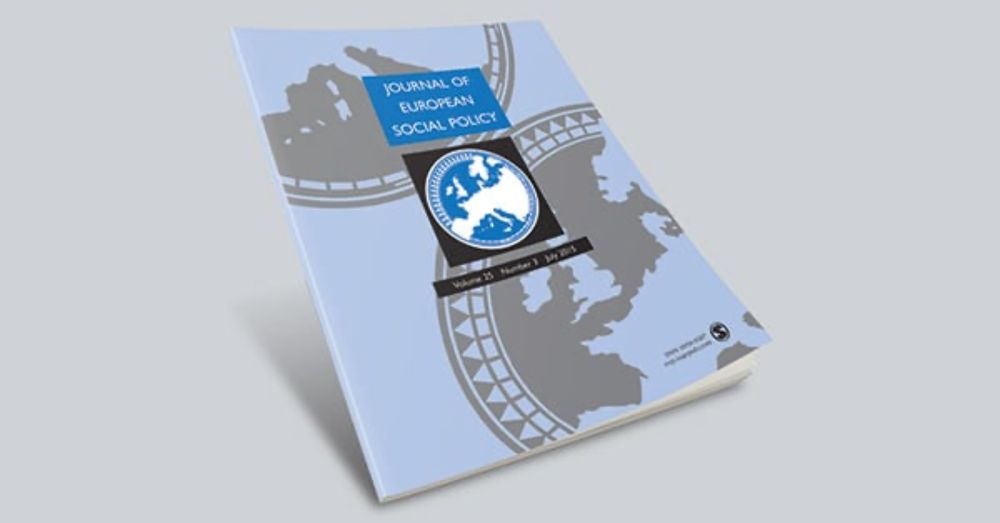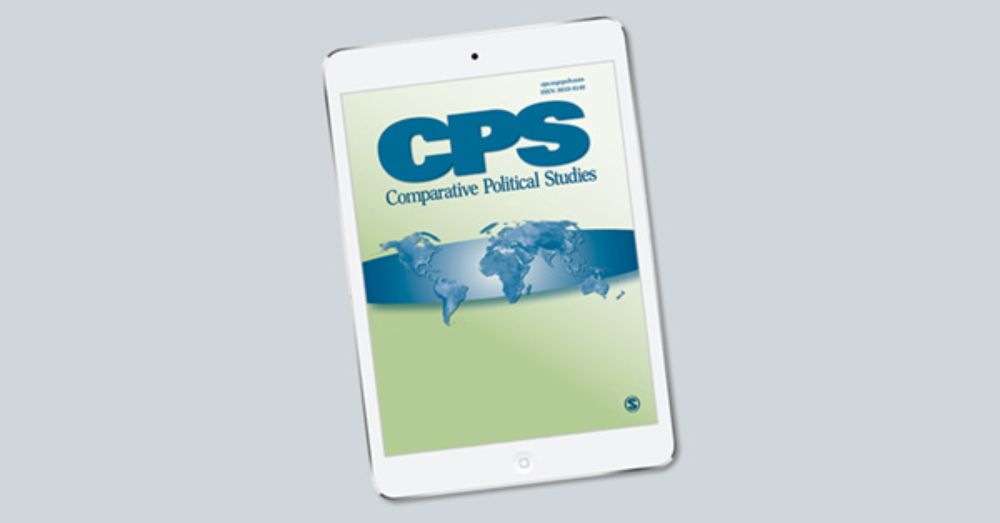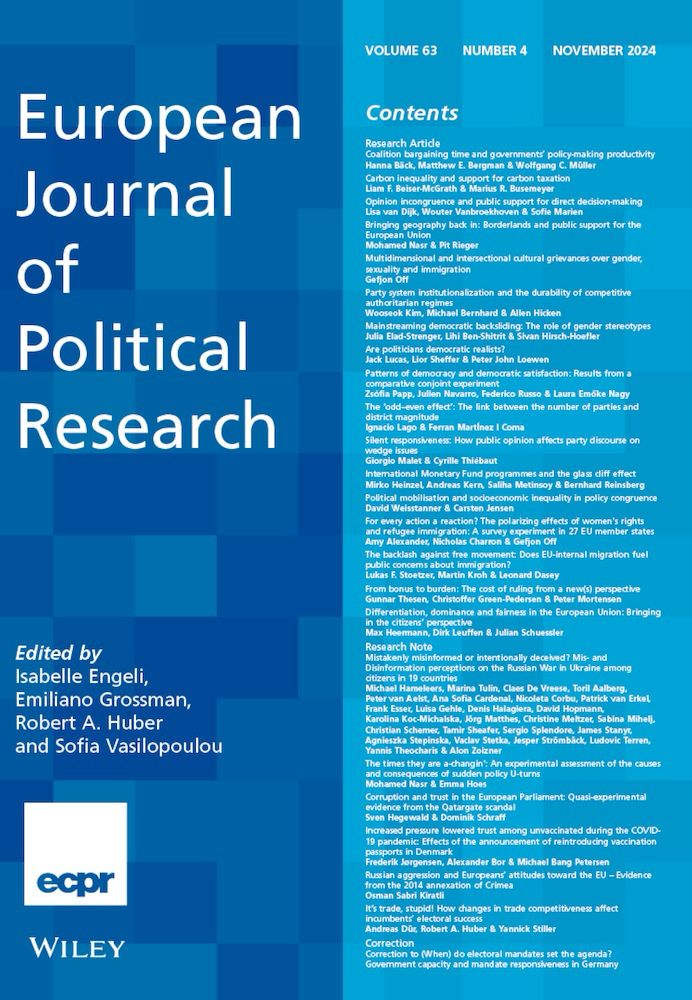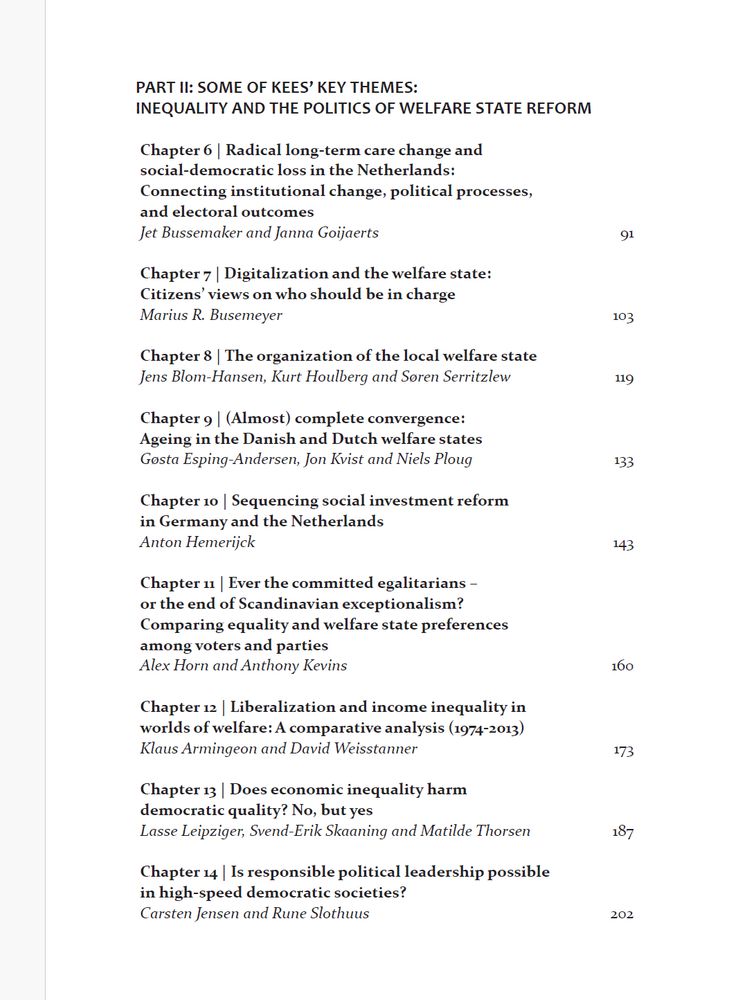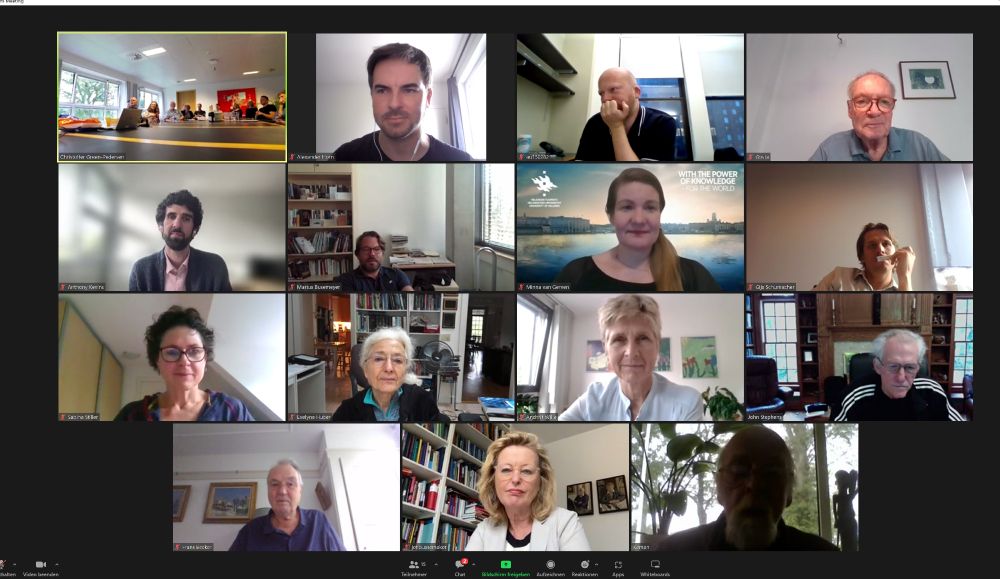
What the graduate unemployment story gets wrong
People with a degree are faring better, not worse than their non-graduate counterparts
"if anything employment outcomes are worsening more rapidly for those with fewer skills looking for blue-collar jobs than the highly skilled seeking knowledge work"
on.ft.com/43eYeRZ
@jburnmurdoch.ft.com as ever doing the essential work.
It's not just AI. And education still matters
10.10.2025 05:41 — 👍 113 🔁 40 💬 1 📌 0

How we think about the political stances of others: evidence on projection from Canada, Germany, and the UK
What leads people to assume that others are more or less similar to them ideologically? To answer this question, this article uses original data from three multi-party democracies to analyse respon...
🚨New Open-Access Research Alert 🚨
Why do we assume that certain people we meet are more or less similar to us politically?
Using data from the UK, Canada, and Germany, @seonghuilee.bsky.social and I explore this question in our new article in @wepsocial.bsky.social.
Check it out online now below.
03.09.2025 10:39 — 👍 8 🔁 3 💬 0 📌 0

Do the origins of climate assemblies shape public reactions? Examining the impact of partisanship
ANTHONY KEVINS, JOSHUA ROBISON
🌅📙 64.3
Governments implement public input with deliberative #MiniPublics
@avkevins.bsky.social & J.Robison investigate whether people see these groups as legitimate using surveys in 🇬🇧 to understand public support for #ClimareAssemblies
🔗https://buff.ly/iggUFJM
20.08.2025 11:30 — 👍 3 🔁 2 💬 0 📌 0
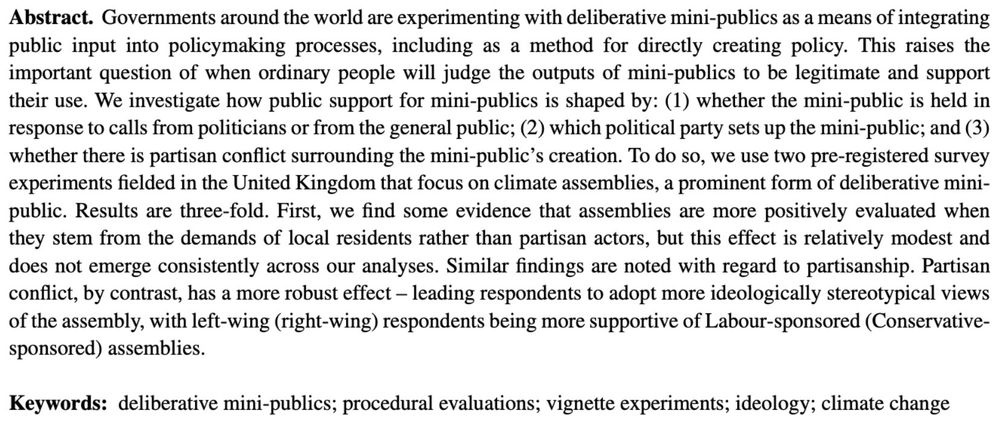
🚨Now officially in print!🚨
Do the (partisan) origins of climate assemblies affect public support for these assemblies?
Using original UK survey data, Joshua Robison and I explore this question in a new EJPR article.
Check it out open access here: doi.org/10.1111/1475...
01.07.2025 14:06 — 👍 4 🔁 2 💬 0 📌 1
Many thanks to our guests and to everyone who attended and contributed to such a thoughtful discussion!
12.05.2025 07:52 — 👍 0 🔁 0 💬 0 📌 0
We were joined by elected representatives from three different levels of government:
• Cllr. Margaret Smidowicz – Charnwood Borough Councillor
• Dr. Jeevun Sandher – MP for Loughborough
• Cllr. Naomi Bottomley – Charnwood Borough Councillor and Leicestershire County Councillor
12.05.2025 07:52 — 👍 0 🔁 0 💬 1 📌 0
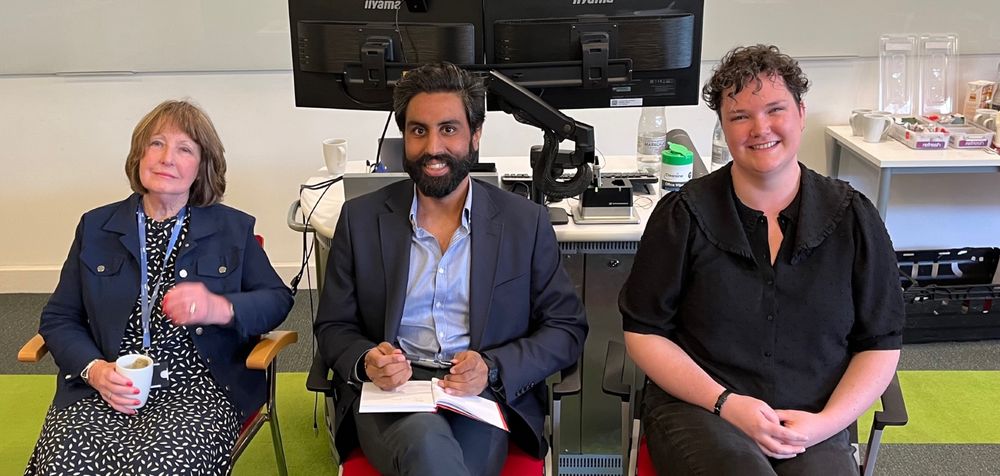
On Friday, I had the pleasure of hosting an event on “Life in Politics,” sponsored by the @lborocrcc.bsky.social and the @lborouniversity.bsky.social Department of International Relations, Politics and History.
12.05.2025 07:52 — 👍 1 🔁 0 💬 1 📌 0
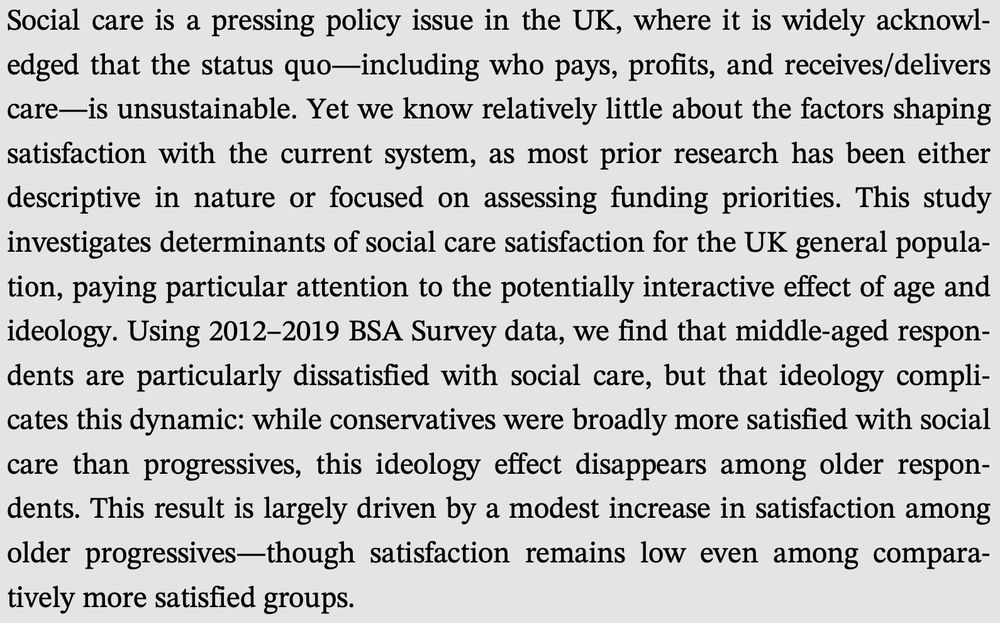
🚨New #OpenAccess study 🚨
What types of people are more or less satisfied with social care in the UK - and how might age and ideology interact to shape satisfaction levels?
Naomi Lightman and I explore these questions in a new, open-access IJSW article: doi.org/10.1111/ijsw...
17.12.2024 12:08 — 👍 0 🔁 0 💬 0 📌 0

The super election year is ending, with many winners and losers.
Our new @thejop.bsky.social paper, (@henrikseeberg.bsky.social, @martinbaekgaard.bsky.social ) asks: How do winning and losing candidates see elections?
Spoiler: Losers are more concerned about fairness.
Link: doi.org/10.1086/734240
11.12.2024 12:09 — 👍 42 🔁 18 💬 3 📌 1
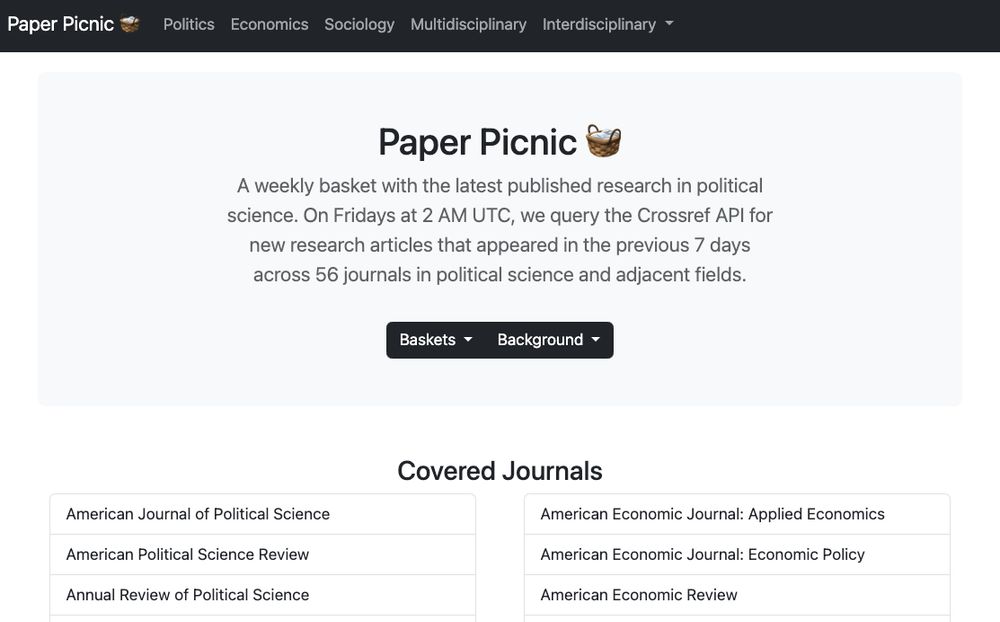
🚨New Tool: paper-picnic.com The latest published political science research (and research in adjacent fields) every Friday. No alert chaos, no registration, no clutter. Powered by @crossref.bsky.social
30.08.2024 13:11 — 👍 68 🔁 33 💬 1 📌 2
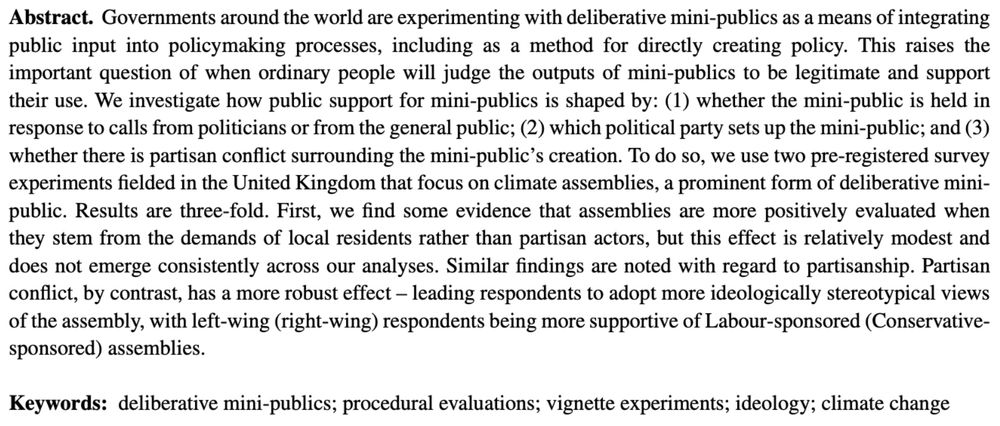
Governments around the world are experimenting with deliberative mini-publics as a means of integrating public input into policymaking processes, including as a method for directly creating policy. This raises the important question of when ordinary people will judge the outputs of mini-publics to be legitimate and support their use. We investigate how public support for mini-publics is shaped by: (1) whether the mini-public is held in response to calls from politicians or from the general public; (2) which political party sets up the mini-public; and (3) whether there is partisan conflict surrounding the mini-public’s creation. To do so, we use two pre-registered survey experiments fielded in the United Kingdom that focus on climate assemblies, a prominent form of deliberative mini-public. Results are three-fold. First, we find some evidence that assemblies are more positively evaluated when they stem from the demands of local residents rather than partisan actors, but this effect is relatively modest and does not emerge consistently across our analyses. Similar findings are noted with regard to partisanship. Partisan conflict, by contrast, has a more robust effect – leading respondents to adopt more ideologically stereotypical views of the assembly, with left-wing (right-wing) respondents being more supportive of Labour-sponsored (Conservative-sponsored) assemblies.
🚨New #OpenAccess study🚨
Do the (partisan) origins of climate assemblies affect public support for these assemblies?
Using original UK survey data, Joshua Robison and I explore this question in a new EJPR article.
Check it out open access here: doi.org/10.1111/1475...
26.11.2024 13:04 — 👍 0 🔁 0 💬 0 📌 0
👩🏾💻 A political science blog site from ECPR, the European Consortium for Political Research.
🔲 Showcasing political science at its best. Get your research noticed beyond the academy http://theloop.ecpr.eu
⬛ ...and follow ECPR @ecpr.bsky.social
Associate professor, Political Science @AarhusUni and @CEPDISCresearch. Distributive justice, controversial markets, discrimination, and organ donation ethics.
Chief Executive, Resolution Foundation
Political Editor of Byline Times and Online Editor of BylineTimes.com. Lobby journalist in the House of Commons. 📩Adam@bylinetimes.com
Subscribe to my Substack ⬇️
https://www.adambienkov.co.uk
PhD @ Loughborough (lboro) University : an animal-human history of vegetarians in Britain, 1850-1939. Thinking about how nonhumans contribute to intellectual histories. Currently working on the philosophy of Anna Kingsford. He/him. danielbreeze.com
We are International Relations, Politics and History at Loughborough University, part of the School of Social Sciences and Humanities. We offer seven undergraduate programmes, an MA in International Security, and doctorates.
Researching how right-wing populism impacts immigrants across Western Europe using causal inference methods
Ph.D. Candidate @tcdpoliticalsci.bsky.social ~ Supported by @researchireland.ie
Professor of European Politics, Uni Copenhagen. EU policy-making, implementation, enforcement, social Europe, EU health policy. Co-editor of West European Politics @wepsocial.bsky.social
Editors: Klaus H. Goetz, Dorte Sindbjerg Martinsen, Wolfgang C. Müller. Posts by social media editor @martingross.bsky.social
WEP on LinkedIn: https://www.linkedin.com/company/west-european-politics/
Pol Comms & Media History researcher, Sociology and Methods teacher, Loughborough University.
Academic librarian, sometimes researcher. Feminist, vegan, trade unionist, uncompromising leftist. Solidarity, ethics, and the Oxford comma. She/her
Research Associate at the Centre for Research in Social Policy at Loughborough University
Senior Lecturer in Political Philosophy at Loughborough University. Books: Just Fodder (McGill-Queen's, 2022) and Food, Justice, and Animals (Oxford, 2023). Host of the podcast Knowing Animals. Website: https://josh-milburn.com
Historian of political thought at Loughborough University. Co-editor of Anarchist Studies (@anarchistsudies.bsky.social).
Reader in Economic Geography, Loughborough University. Creative industries, music, tech and platforms. Associate Editor, Geoforum.
Ex-prof, but still in with a shout on language, interaction etcetera
Prof of Literature, Politics & Performance at Loughborough University. Head of English. Editor of ‘Playwriting and the Contemporary: Critical Collaborations’ @livUniPress. Contemporary theatre, age studies & utopianism.
Loughborough University (UK). Research on language and social interaction, conversation analysis, communication in palliative and end-of-life care, gender in social interaction
Historian (mostly of Japan) and trade unionist (mostly in UCU). Also into queer stuff. Uk-wide elected HE rep - UCU NEC. He/him



